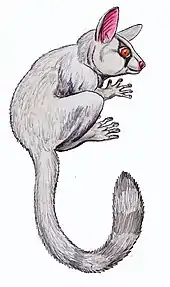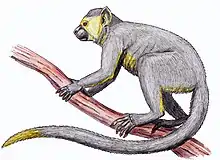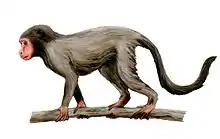| Nosmips Temporal range: Late Eocene[1] | |
|---|---|
| Scientific classification | |
| Domain: | Eukaryota |
| Kingdom: | Animalia |
| Phylum: | Chordata |
| Class: | Mammalia |
| Order: | Primates |
| Family: | incertae sedis |
| Genus: | †Nosmips Seiffert, 2010 |
| Species: | †N. aenigmaticus |
| Binomial name | |
| †Nosmips aenigmaticus Seiffert, 2010[2] | |
Nosmips aenigmaticus is a rare fossil primate known only from 12 teeth. Most teeth were found at a site in the Fayum Depression about 40 miles (64 km) outside Cairo, Egypt.[3]
Nosmips aenigmaticus probably lived 37 million years ago in Africa and has not been successfully classified within any group of primates.[4] In particular, it is distinct from the three main branches of primate found in Africa at the time - anthropoids, adapiforms and lemuriforms. It is weakly associated with the Eosimiidae. Its premolars are specialised and the tooth enamel displays extensive signs of pitting, which would appear to be consistent with a diet of either seeds or fruits with hard pits.[5]
Name
Nosmips is an anagram of Simpson. The name was chosen to honour paleontologist and anagram enthusiast George Gaylord Simpson.
References
- ↑ "PBDB". paleobiodb.org. Retrieved 2021-07-28.
- ↑ E. R. Seiffert, E. L. Simons, D. M. Boyer, J. M. G. Perry, T. M. Ryan and H. M. Sallam. 2010. A fossil primate of uncertain affinities from the earliest late Eocene of Egypt. Proceedings of the National Academy of Sciences 107(21):9712-9717
- ↑ Odd mosaic of dental features reveals undocumented primate
- ↑ Yahia, M. 2010. A new evolutionary mystery. Nature.
- ↑ Seiffert, Erik R.; Boyer, Doug M.; Fleagle, John G.; Gunnell, Gregg F.; Heesy, Christopher P.; Perry, Jonathan M. G.; Sallam, Hesham M. (2017-04-10). "New adapiform primate fossils from the late Eocene of Egypt". Historical Biology. 30 (1–2): 204–226. doi:10.1080/08912963.2017.1306522. ISSN 0891-2963. S2CID 89631627.



